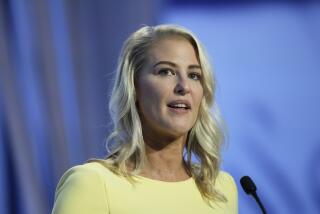Ex-Officials of Honig Organization Tell of Suspicions : Education: Grand jury makes public the testimony about concerns that a conflict of interest existed between the superintendent and his wife’s business.
- Share via
SACRAMENTO — A former executive director of a parent involvement program run by Nancy Honig, wife of state schools chief Bill Honig, told a state grand jury she was eased out of her job after complaining that the organization and the state Department of Education were too closely intertwined.
In testimony made public Monday, Linda Page said she was told that all parental involvement projects sponsored by the department first had to be approved by Nancy Honig’s private, nonprofit Quality Education Project.
Honig is accused of four counts of violating state conflict-of-interest laws for allegedly using state and federal money to pay consultants for his wife’s enterprise, from which she drew a salary of $108,000 a year.
In addition, the Honigs collected at least $30,000 in rent from QEP, which operated out of the Honig residence in San Francisco until recently.
Patrick Hallinan, one of Honig’s lawyers, said “there is no crime” disclosed in the grand jury material because the school districts involved got the programs they contracted for and no public funds were paid to either Honig.
“If I lose this one, I’ll go back to digging up arrowheads,” said Hallinan, who has a Ph.D. in archeology.
In her testimony, Page said she spent years with QEP but reached the point where she became uncomfortable when QEP was authorized in the fall of 1988 to approve all parent involvement programs undertaken by the state Department of Education--in effect, assuming a supervisory role over policy in a state agency.
After telling Nancy Honig “I didn’t think that was right,” Page’s duties were reduced, she told the grand jury.
“More and more she just began to bypass me (and) . . . essentially took the reins,” said Page, who left the organization in March, 1989.
Daniel Rodriguez, who was a statewide QEP coordinator from 1986 to 1989, testified that he, too, began to get nervous about a possible conflict of interest on Bill Honig’s part.
After Honig talked to assembled QEP staff members about parental involvement during a dinner meeting at the Honigs’ home, Rodriguez said he told himself this could be viewed as “insider trading” and “that planted the seed that at some point this was going to blow and I needed to distance myself from it.”
Rodriguez said he left QEP shortly afterward.
As they presented 36 witnesses over a period of nine days in March, Deputy Attys. Gen. Cindy Besemer and Harry J. Colombo stressed the complexity of the case.
“This is a little different from your run-of-the-mill criminal investigation,” Colombo said at one point, “from the standpoint that it’s not like there’s a dead body and there’s three people standing outside and one of them holding the smoking gun.”
Instead, the two prosecutors produced witnesses who told a complicated story:
More than $337,000 in state and federal money was used by the education department to pay salaries for four employees of three school districts to set up QEP programs in those and other districts.
“That money was directed to those school districts as conduits to pay employees of the Quality Education Project,” Besemer said, “to develop a program for QEP, to go out and market and raise monies from various institutions” and were also paid to “test that product” and “sell the product.”
Because of the efforts of people paid by the education department, with Honig’s blessing, QEP was able to grow from a money-losing venture into one that secured millions of dollars in grants from companies and private foundations and was able to pay Nancy Honig a handsome salary, prosecutors argued.
The QEP controller testified that Nancy Honig, who resigned the $108,000 presidency in January, now earns about $10,416 a month as she works on QEP projects in Mississippi and other places outside California.
Bill Honig has said that the indictment is the result of a “conservative cabal” involving Atty. Gen. Dan Lungren, a Republican, and both political and religious conservatives who are angry at Democrat Honig’s positions on a variety of issues, ranging from his espousal of evolution in state biology textbooks to his arguments with former Gov. George Deukmejian over school budgets.
Honig has also contended, in several public statements and interviews, that no crime has been committed because the people whose salaries were paid by the education department “did the work, the districts got full value, there were no complaints.”
He also has said that QEP spent about $500,000 of its own money--funds that were raised from private donors and foundations, to assist the same school districts.
“How do they (QEP) put themselves in better shape to pay Nancy’s salary by depleting their resources by five hundred thousand bucks?” the superintendent asked.
“You have to have two things for a criminal charge,” he said. “You have to have intent to do something bad and there has to be some benefit going to QEP.”
However, in her summary comments to the grand jury, Besemer said: “To constitute general criminal intent, it is not necessary that there should exist an intent to violate the law.
“When a person does that which the law declares to be a crime, he or she is acting with general criminal intent, even though he or she may not know that his or her act or conduct is unlawful.”
That is what Honig did, Besemer contended, when he gave favored treatment to his wife’s organization.
More to Read
Sign up for Essential California
The most important California stories and recommendations in your inbox every morning.
You may occasionally receive promotional content from the Los Angeles Times.













